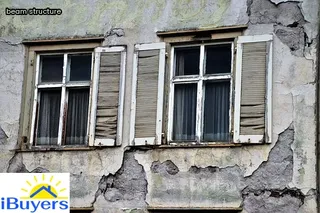Identifying foundation problems is an essential part of protecting your home's foundation. The most common signs of foundation issues can include cracking in walls or floors, doors and windows that stick or don't open and close properly, gaps around window and door frames, bowing or leaning walls, sloping floors, and standing water near the foundation.
Homeowners should also keep an eye out for visible cracks in the foundation itself. While some minor movement of a home's foundation can be normal with changes in weather conditions and soil expansion, larger movements may indicate serious problems that require repair.
It is important to note that these issues may not be immediately visible when you first purchase a home - they may take time to become apparent. Therefore, it is important to regularly inspect your home's foundation for any potential issues so they can be addressed before they become more serious.
Foundation repair is often expensive, but it can save homeowners thousands of dollars in the long run by avoiding further damage to their homes.

Foundation problems are surprisingly common, and can be caused by a variety of factors. One major source of foundation damage is shifting soil, which may be due to changes in moisture content, poor drainage or even earthquakes.
Poor construction techniques are another frequent cause of foundation issues, as is the use of low quality building materials. Foundation problems can also be sparked by excessive weight on the structure from additions such as extra rooms or heavy landscaping elements like retaining walls and pools.
Lastly, plumbing leaks can also cause significant foundation damage if they go unnoticed or unrepaired for an extended period of time. It is essential that homeowners take preventative steps to protect their home's foundation in order to avoid costly repairs down the road.
It is important to be aware of the signs of foundation distress in order to protect your home’s foundation.
Common signs of foundation distress include cracks in walls, floors, and ceilings; sticking doors or windows; sloping floors; gaps between walls and flooring; water pooling near the foundation; bowing or leaning chimneys or walls; and shifting foundations.
Additionally, any noticeable change in the structure of your home—such as a sloping floor, a door that no longer closes properly, or a crack running vertically through a wall—can indicate a problem with your foundation.
It is essential to be mindful of these signs so that you can identify any issues before they become more serious and costly problems.

As a homeowner, it's essential to address any unevenness in your foundation as soon as possible. Unaddressed foundation issues can lead to costly repairs or even the need to replace your entire foundation in the future.
To protect your home and its foundation, you must first identify any signs of an uneven foundation, such as cracks in walls or floors that are not level. Once you've identified any potential issues, you should contact a professional contractor who specializes in foundation repair.
They will be able to assess the issue and recommend a course of action that is best for your particular situation. Additionally, they can provide guidance on preventative measures you can take to help protect your home's foundation from further damage.
Foundation repair isn't something that should be taken lightly – it's an important part of maintaining the security and stability of your home for years to come.
When it comes to foundation repair, one of the most common problems is a washed out foundation. This occurs when there is too much water pressure around the foundation, which can cause the soil to erode away and leave the foundation exposed.
Foundation repair services can help you determine the best course of action for repairing your home’s washed out foundation. The first step in any type of foundation repair is to assess the damage and determine how severe it is and if further repair work should be done.
If you are dealing with a washed out foundation, you will need to check for signs of erosion such as cracks or gaps in the walls. If these are present, it is important to act quickly in order to prevent further damage from occurring.
In some cases, adding soil or sand bags around the perimeter of your home’s foundation may be enough to hold back the water pressure, but more severe cases may require replacement of damaged sections of concrete or even shoring up with additional support beams or piers. Foundation repair services can provide guidance on what steps need to be taken in order to protect your home’s foundation from further damage caused by a washed out condition.

When it comes to foundation repair, concrete foundations are among the most common and important components of a home. When these foundations become damaged or shifted due to soil erosion, the entire structure of the house can be affected.
To protect your home’s foundation from further damage, it is essential to take steps for concrete foundation repair. This typically involves examining the source of the problem, such as soil erosion or improper drainage, and taking preventive measures such as reinforcement or anchoring systems to help prevent future shifting.
Proper maintenance and regular inspection are also important in order to detect any problems that may arise early on before they become more serious issues. With proper knowledge and understanding of how to properly repair a concrete foundation, homeowners can ensure that their home's foundation remains strong and secure for years to come.
It is important to investigate further if there are no obvious causes for foundation problems. There could be unseen issues that require the expertise of a structural engineer or foundation repair specialist.
A thorough inspection can uncover any underlying issues such as soil movement, water drainage, and structural damage caused by tree roots or ground-leveling projects. Poor soil compaction can lead to excessive settling and cause cracks in foundations and walls.
Too much moisture around the base of a home can also cause the soil to expand, leading to movement of the foundation and resultant damage. If your home is settling unevenly, it could be due to drainage problems or poorly compacted soils that are not evenly distributed around the foundation of your home.
Poor maintenance of gutters and downspouts can also contribute to water buildup near your home’s foundation, leading to cracking and settling in walls and flooring over time. In order to properly assess these potential causes for foundation damage, it is essential to enlist an experienced professional who can recommend an appropriate solution for your particular situation.

When it comes to foundation repair, it is essential to identify the best strategy for protecting your home. It is important to consider the type of foundation, its age and condition, as well as the severity of the damage before deciding on a repair approach.
For example, slab foundations require different methods than those used for block or pier and beam foundations. Additionally, it is important to factor in potential environmental issues such as soil conditions and drainage problems that may be impacting your home's foundation.
Furthermore, there are several repair approaches ranging from simple patching and reinforcing to more complex underpinning or piling solutions. Finally, costs should also be taken into consideration when selecting a method of repair.
Ultimately, working with an experienced professional can help you determine which approach will provide the most efficient and effective solution for your particular situation.
When it comes to foundation repair, there are a few different types of foundations to consider. Each has its own unique benefits and drawbacks, so it’s important to do your research before deciding which type of foundation is best for your home.
Slab foundations are the most common type and are typically made from concrete. These provide support for a single-story structure, but they may require extra reinforcement if the soil beneath them is unstable.
Another option is a crawl space foundation, which uses piers or columns to support the structure above. This type of foundation offers more flexibility in terms of repairs, as well as better ventilation than a slab foundation.
Finally, basement foundations offer increased protection against moisture and provide additional storage space. Before deciding on a particular type of foundation, you should assess the soil conditions in your area and make sure that the ground beneath your home can adequately support the chosen structure.
Foundation repair professionals can help you determine which type of foundation is best for your property and how to protect it over time.

Foundation repair is an essential part of maintaining a home’s structural integrity, and it must be done correctly. Unfortunately, regional factors can impact the likelihood of foundation failure.
Areas with extreme weather conditions, soil types, and moisture levels may put additional stress on a home’s foundation, causing cracks or other damage to occur. Additionally, homes in areas prone to flooding or earthquakes may be more likely to experience foundation issues due to the added ground movement or water pressure.
Homeowners should always assess their regional environment and take necessary steps to ensure their foundation remains secure. Home maintenance contractors specializing in foundation repair can provide detailed inspections, advice on the best materials for repairs, and assistance with any necessary replacements or reinforcements.
Taking these proactive measures will help protect homeowners from costly repairs in the future and maintain a safe living environment for years to come.
Foundation repair is a critical component of protecting your home's structural integrity. Understanding the different types of soil that are present in your area and how they can affect foundations is essential.
Clay soil, for instance, has a tendency to expand and contract with changes in moisture content, which can cause foundation movement and cracks. Sandy soils may not have enough bearing capacity or stability to adequately support a foundation, leading to settling and sinking.
Loose or silty soils are also prone to settling and shifting due to their low cohesiveness. It’s important to know the type of soil present in your area so you can ensure the proper measures are taken when constructing your foundation.
Additionally, it’s essential for homeowners to understand the signs that indicate foundation damage such as bowing walls, cracks in drywall, doors not closing properly, uneven floors and sagging beams. By regularly monitoring these signs, you can catch any potential issues before they become more costly problems down the road.

Foundation repairs can come with a hefty price tag and the cost of your repair will depend on the extent of the damage. It's important to consider all related expenses when assessing the overall cost of foundation repairs, such as excavation costs, materials, labor, inspections, and permits.
Excavation is often necessary in order to access underground areas and may be needed for foundation piers or other stabilization methods. Materials used in foundation repair can range from concrete blocks to steel beams and may require additional costs for special orders or delivery fees.
Labor costs for foundation repairs typically include wages for carpenters, masons, and laborers. Inspections are necessary after repair work has been completed in order to ensure that everything was done properly and according to code.
Permits should also be acquired before any work begins in order for your contractor to legally complete the job. All these factors should be considered when estimating the total cost of foundation repairs and related expenses.
When it comes to selling a home, the most important factor is usually its condition. Foundations are an integral part of any structure and need to be in good shape for a successful sale.
Foundation repair is essential for protecting your home's value and ensuring a smooth transaction. It is also important for preventing costly repairs down the line.
Before selling, foundation repair should be considered to ensure that the house will pass inspection without any issues. Foundation repair involves correcting any structural issues caused by water damage, soil erosion, or other environmental factors like earthquakes or hurricanes.
While foundation repair can seem daunting, there are many resources available to guide homeowners through the process. With the right tools and knowledge, anyone can take steps to protect their home's foundation and prepare it for sale.

Purchasing a house with a faulty foundation is not advisable, as foundation repair can be expensive and time-consuming. Foundation problems can potentially lead to structural damage, so it’s essential to assess the condition of the foundation before you make an offer on a home.
It’s important to understand the basics of foundation repair so that you can make an informed decision about whether or not to purchase the property. Knowing about different types of foundations and their common issues will help you determine whether or not repairs are needed.
Some common signs that indicate a need for foundation repair include cracks in walls, uneven floors, and water seepage in the basement. A professional inspection is recommended to evaluate the overall condition of your potential new home’s foundation, with an expert opinion helping you to decide if it’s wise to proceed with the purchase.
Taking into consideration all aspects of foundation repair outlined in this essential guide is key for protecting your home's foundation along with your peace of mind when making real estate decisions.
Foundation repair is a critical part of protecting the integrity of your home and preventing costly damage in the future. When it comes to deciding between doing the work yourself or hiring a professional, there are both pros and cons to consider.
If you opt for DIY foundation repair, you can save money upfront; however, it can be more time consuming and may require specialized equipment that you may not have available. Hiring a professional is likely to cost more, but they can often complete the job faster and with better results due to their expertise and access to necessary tools and materials.
Professional services also typically come with warranties whereas DIY repairs usually do not. Ultimately, the decision should be based on your budget and comfort level with taking on such a project.

Homeowners insurance policies are designed to provide coverage for damages caused by events such as fire, theft, and storms. Foundation-related issues can also be covered under certain circumstances; however, it is important to understand the specifics of your policy and the limitations associated with foundation repair coverage.
This article will address common questions about homeowners insurance coverage for foundation issues so that you can be better prepared if a problem arises related to your home's foundation. It is important to note that most homeowners insurance policies do not cover foundation damage caused by normal wear and tear or environmental factors such as soil movement or groundwater saturation.
However, some policies may offer protection against structural damage due to faulty construction or inadequate maintenance. In addition, many policies will provide some coverage for repairs resulting from ground shifting caused by earthquakes or landslides.
Understanding what your policy covers and how much you might need to pay out of pocket for any repairs can help you make an informed decision about protecting your home's foundation in the future.
When it comes to foundation repair, the most important step is to understand any common cracks that may exist in your basement walls. It is important to note that not all cracks are created equal - some can be purely cosmetic and harmless, while others can be a sign of structural damage.
Horizontal cracks are typically caused by pressure from the soil outside your walls pushing against them, while vertical cracks can be due to settling or shrinkage of the basement wall material. If you find any diagonal or stair-shaped cracking, this could indicate unstable soil conditions around your home’s foundation.
To prevent further damage and ensure your home's foundation is secure, it is best to contact a professional for an inspection and advice on how best to address any cracks you find.
The foundation of a house is the most important part of any home and it is essential to protect it. Foundation repair may seem expensive, but in the long run, it can save you thousands of dollars.
Foundation repair can help improve the structural integrity of your home, prevent water damage, and increase the market value of your property. It can also help reduce energy costs by providing better insulation and air circulation.
The benefits of foundation repair far outweigh the cost, making it an investment worth making for homeowners who want to protect their homes from future problems. Taking proactive steps to maintain and fix your foundation will ensure that your house remains safe and secure for years to come.

Foundation repair is an essential part of protecting your home's foundation. If you have a bad foundation, it needs to be fixed quickly and properly.
Fortunately, there are a variety of options available for fixing a bad foundation on a house. To start, the most common method of repairing foundations is by using concrete piers or pilings.
These are driven into the ground in order to provide extra support and stability to the structure. Other methods include steel I-beams, helical piles and underpinning.
All of these solutions are designed to provide extra support and reinforcement for the existing foundation so that it can be stabilized and strengthened. In some cases, waterproofing may also be necessary in order to protect your home from water damage due to rain or flooding.
Once the repairs have been completed, regular inspections should be conducted in order to ensure that the foundation is secure and stable. By taking proactive steps to protect your home's foundation with proper maintenance and repair, you'll be able to extend its lifespan for many years to come!.
The best way to fix a foundation is to get an experienced foundation repair professional. Foundation repair professionals are trained in all aspects of foundation repair and can identify the specific problem quickly and accurately.
They will inspect the area for any potential signs of damage, such as cracks, bowed walls, settlement, or corrosion. After determining the cause of the problem, they will be able to provide advice on how to best repair it.
Common methods include installing new footings or piers, reinforcing existing footings or piers with steel reinforcements, replacing damaged blocks or bricks with new ones, or applying specialized coatings and sealants. In addition to repairing the foundation, these professionals may also recommend preventive measures such as waterproofing and soil stabilization.
By taking this comprehensive approach to fixing your home's foundation, you can help ensure that it remains stable and secure for many years to come.
Foundation repair is a complex process that is best left to experienced professionals. However, there are steps you can take to protect your home's foundation from further damage.
Regularly inspecting your home's foundation for signs of cracking, shifting or settling and performing minor repairs as needed will help keep your foundation strong and stable. Additionally, it's important to be mindful of the soil around your home's foundation, as even small changes in moisture content can cause significant damage over time.
If you notice any signs of distress in your home's foundation, contact a qualified professional who specializes in foundation repair right away. Taking proactive steps to protect your home's foundation now will save you money and headaches down the road.